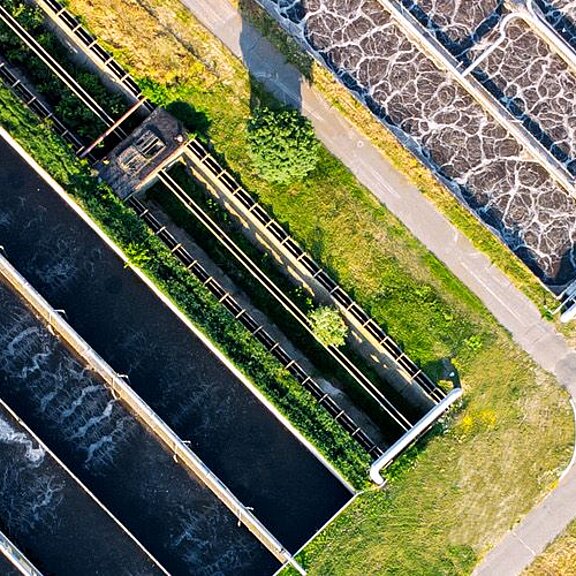

In Germany, there are over 5,700 water supply companies and around 5,100 sewage treatment plants. Their task is to ensure the supply of clean drinking water to approximately 82 million inhabitants and dispose of and purify wastewater.
The Süderdithmarschen Water Association is responsible for this task between Heide and Brunsbüttel to the north-west of Hamburg. It supplies 60 municipalities with around 72,000 inhabitants over an area of 825 km2 with fresh drinking water. 28,000 m3 of water is pumped into the pipes every day. The Water Association also includes four sewage treatment plants that purify the wastewater.
The Water Association, Süderdithmarschen, supplies 60 municipalities with around 72,000 inhabitants with fresh drinking water.
Water and sewage treatment plants are part of the critical infrastructure in Germany. This means their services must be available 24 hours a day, seven days a week.
To ensure that the water supply and wastewater disposal function smoothly, many electrical consumers are required, such as pumps, drives for aerators, agitators, traction drives, valves, and flow meters.
If even one of these consumers fails, the water supply or wastewater disposal can be severely disrupted. Prolonged interruptions, which would be necessary for the periodic inspection, are undesirable, as they would impair the 24/7 supply.
More prolonged interruptions due to periodic inspections impair the 24/7 supply.
The periodic inspection of electrical systems is more or less a challenge for every company. On the one hand, the inspection is very time-consuming and labour-intensive. Secondly, the electrical systems or system components must be switched off and disconnected from the mains supply to measure the RISO insulation resistance.
This task cannot be accomplished with the electrical specialists employed by the Water Association Süderdithmarschen. Firstly, systems would have to be disconnected from the grid for a longer period of time, and secondly, the electricians would not be available to do their other tasks.
A solution, therefore, had to be found to reduce the time and effort required for electrical testing.
The recurrent test is very time-consuming and labour-intensive. A solution had to be found that reduced the effort involved.
When the water and sewage treatment plant was due for renovation, most of the switchgear was also to be replaced. The aim was to make the entire plant fit for the future and to take account of the increasing shortage of skilled labour.
An essential aspect of modernisation was to reduce the cost of periodic inspections and avoid shutting down water and sewage treatment plants. At the same time, all important measured values should be brought together and visualised in the monitoring centres.
With the specialised electrical planning, Magnussen EMSR-Technik GmbH was commissioned. To permanently monitor the electrical systems, they opted for residual current measurement technology from Bender. This is capable of permanently monitoring entire systems or parts of systems in earthed networks (TN system), i.e. 24/7. Residual current measuring devices can detect residual currents in circuits and report critical values or failures centrally to the control technology. At the same time, permanent residual current measurement in electrical installations is recognised as a replacement for the time-consuming RISO measurement.*
To fulfil the requirements for holistic monitoring, the planning was carried out so that the measurement technology individually monitors all important system components and consumers (pumps, valves, drives, flow meters, external lighting, etc.). Only with granular monitoring can errors be identified quickly and fewer personnel be involved. ** For the Süderdithmarschen Water Association, the concept of detailed and holistic monitoring was important to avoid the need for subsequent retrofitting.
* The German DGUV Regulation 3 states that the RISO measurement can be omitted from the periodic inspection of an electrical system if the system is continuously maintained by qualified electricians and checked by permanent or continuous metrological measures during operation.
In the UK, the BS 7671 standard permits continuous residual current monitoring to replace periodic insulation resistance testing. See BS 7671: 2018, chapters 651.2 and 652.2 for more information.
Since last year, residual current measurement technology from Bender has gradually been installed in the water and sewage treatment plants. The Water Association's electricians carry out the installation based on the planning documents.
The LINETRAXX® RCMS150 multi-channel residual current monitoring devices are used to monitor drives, pumps, and other vital systems. These can monitor six circuits simultaneously and take up very little space in the switch cabinet. In addition, RCMB330 split-core measuring current transformers and CTUB102-CTBC20 AC/DC sensitive measuring current transformers are used.
The new SmartDetect residual current monitoring devices, LINETRAXX® RCMS410, are used as evaluation devices. These are particularly small, very flexible, and can monitor four channels simultaneously. The COMTRAXX® COM465IP Condition Monitors/gateways were used as the interface. These handle the communication between the measuring devices and forward the data to the higher-level control system via Modbus.
The permanent monitoring of electrical systems or system components in water and sewage treatment plants has many advantages. These include:

Get in touch with us! Our staff will be happy to help you.
Contact form